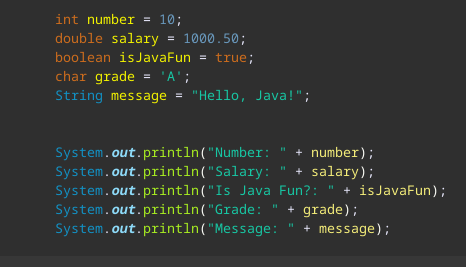Variables in Java: Concept and Usage

Author: Alexandre Java - Published May 16, 2024
Variables in Java are fundamental units for storing data that can be used to store temporary or permanent information during the execution of a program. They represent memory locations that can hold values that may be modified throughout the program's execution.
Types of Variables:
In Java, variables can be categorized into different types depending on factors such as their scope, the type of data they store, and their lifetime. The main types of variables in Java include:
- Local Variables: These are declared within a method, constructor, or block and can only be accessed within the scope they are declared in.
- Instance Variables (or Object Members): These are declared within a class but outside of any method and are associated with specific objects of that class. Each object has its own copy of these variables.
- Static Variables (or Class Members): These are declared with the
staticmodifier and are shared by all instances of a class. They are initialized only once, at the time the class is loaded. - Parameter Variables: These are variables declared in a method signature and receive values when the method is called. They are used to pass information into methods.
Declaring Variables:
In Java, variables are declared by specifying their data type, followed by the variable name, and optionally, an initial value. For example:
int age; // Declaration of an integer variable named "age"
double salary = 1000.50; // Declaration and initialization of a double variable named "salary"
Naming Conventions:
It is a common practice in Java to follow naming conventions when naming variables. For example, variable names should start with a lowercase letter, with subsequent words starting with uppercase letters (camelCase). Additionally, variable names should be descriptive and meaningful to facilitate understanding of the code.
Example Usage:
public class ExampleVariables {
public static void main(String[] args) {
int number = 10;
String name = "John";
System.out.println("The number is: " + number);
System.out.println("The name is: " + name);
}
}
In this example, we declare and initialize two variables, number and name, and then display them to the standard output.
Conclusion:
Variables in Java are crucial elements for storing and manipulating data during program execution. Understanding the different types of variables and how to declare and use them correctly is essential for effective Java application development.